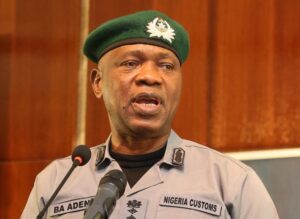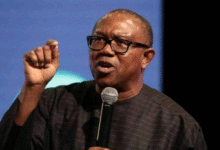Customs Must Be Central to AfCFTA Implementation for Africa’s Long Term Success – CGC Adeniyi

The Comptroller-General of Customs, Dr. Bashir Adewale Adeniyi, has highlighted the pivotal role of Customs in the implementation of the African Continental Free Trade Area (AfCFTA), asserting that it is essential to the continent’s economic growth and long-term success.
CGC Adeniyi also outlined Nigeria’s renewed commitment to deepening continental trade integration and strengthening Customs-led reforms ahead of the maiden Customs Partnership for African Cooperation in Trade (C-PACT) Conference, scheduled for 17 to 19 November 2025 in Abuja.
Addressing journalists at the State House Press Pool under the “Meet the Press” platform in Abuja on Friday, he affirmed that President Bola Ahmed Tinubu’s recent approval of an extension of his mandate came with clear performance targets focused on trade facilitation, port decongestion, and the modernisation of Nigeria’s cross-border systems.

Adeniyi noted that President Tinubu’s policy directives reflect a deliberate shift towards using trade as a major engine of economic expansion, stressing that the administration is determined to reposition Nigeria as a central hub for intra-African commerce.
“Mr President has made it very clear that he intends to use trade to promote economic development and alleviate poverty. So, I was not surprised that the implementation of the continental free trade agreement was specifically mentioned in my renewed mandate,” he said.
The Customs boss disclosed that since receiving the directive, he has intensified engagements with his counterparts across Africa, including a recent strategic meeting in Ghana with the Secretary-General of the AfCFTA.
He emphasised that the NCS is pushing for greater involvement of Customs administrations in implementing the free trade regime, maintaining that sustainable integration cannot happen without Customs at the centre.
“For many years, regional trade arrangements struggled because Customs was not brought in early enough. I have made this point repeatedly: if we must achieve the objectives of AfCFTA, Customs must play its role in enforcing rules of origin, applying preferences, and ensuring that goods genuinely enjoy the benefits of the agreement,” he said.
According to him, the forthcoming C-PACT Summit in Abuja represents a major step in correcting past gaps and opening direct engagement between African Customs administrations, policymakers, and private-sector operators.
He acknowledged that more than 30 Customs administrations have registered for the summit, with 22 of them led by Directors-General, emphasising that the surge in private-sector interest is the most encouraging indicator so far.
The CGC also revealed that Nigeria will, for the first time, host the Secretary-General of the World Customs Organisation (WCO), Ian Sanders, during the conference, describing the development as a significant recognition of Nigeria’s increasing leadership role in continental trade diplomacy.
He pointed out the growing momentum in Nigeria’s export performance, noting that volumes have increased by more than 30 per cent in the past two years.
“The current challenge is to redirect more of this trade towards African markets,” Adeniyi remarked, while acknowledging strong support from the Federal Ministry of Finance, the Ministry of Industry, Trade and Investment, Afreximbank, the Nigerian Export Promotion Council, port authorities, and other agencies involved in cross-border trade.
He explained that their alignment has created “a historic window” for Nigeria to assume a commanding role in Africa’s economic transformation.
He further urged the State House Press to help raise public awareness ahead of the Abuja summit, adding that the first day of the programme will feature direct conversations with private-sector operators from across Africa to uncover the persistent barriers they face in moving goods across the continent.







